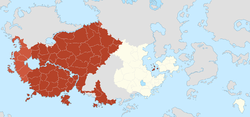Jingdaoese Community
| Tianchao Jingdao Jingdaoese Diwangate | |||
| |||
| Motto: Sensible and Ruthless | |||
| Anthem: Harmonious Anthem | |||

| |||
| Map versions | As part of Shireroth (Kildare): 1.5.0 - 15.4.6 | ||
| Capital | Daocheng | ||
| Largest city | Chuanliyang, Sizhecheng, Tianhoucheng, Xiacheng, Zhuaricheng | ||
| Official language(s) | Official language: Jingdaoese Other languages: | ||
| Official religion(s) | Tianchaodao | ||
| Demonym | Jingdaoese | ||
| - Adjective | Jingdaoese | ||
| Government | Federal parliamentary semi-constitutional monarchy | ||
| - Heavenly Light | Xinshi Emperor | ||
| - Diwang (Head of the Grand Secretariat) | Hon Ben Erasmus | ||
| - Legislature | Chao Suweiai | ||
| Establishment | As Community within the Great Apollonian Empire: 1700 AN | ||
| Area | NA | ||
| Population | ~530.367.327 (01.01.1700) | ||
| Currency | Golden Kala | ||
| Abbreviation | DAO | ||
| Mains electricity | |||
| Driving side | Right | ||
| Track gauge | |||
| Calendar | |||
| Time zone(s) | CMT-3 | ||
| National website | jingdao.nl | ||
| National forum | Forum (2) | ||
| National animal | Zuxiangese dragon | ||
| National food | Safir wings with cabbage | ||
| National drink | Imperial white tea | ||
| National tree | Golden Lotus Flower | ||
The Jingdaoese Community, or the Great Jing within Great Apollonia, is one of the Communities within Great Apollonia. Its several States roughly encompasses the former Great Jing Dynasty. While consisting of many ethnicities, the Jing still dominate both political and economical positions.
With the incorporation of Jingdaoese territories into the Great Apollonian Empire in 1700 AN, States received tremendous autonomy over affairs. These changes angered the reactionaries within the Grand Secretariat and Heavenly Court, both which distrusted either the Great Apollonian project or court politics in Agra. Hon Ben Erasmus and his Gang of Four successfully replaced Diwang Jin San in the power struggle.
Democratic and pro-Apollonian forces decided to ignore the fight over title of Diwang, which seemingly had become a glorified honour title as a central Jingdaoese administration was to be replaced by a Community with powerful States. However, Hon Ben Erasmus immediately set out on strengthening his own position, at the expense of the Heavenly Light. The Xinshi Emperor was reduced to a spiritual guide, granting her worldly authority to the office of the Diwang. With this power move, the Jingdaoese Diwangate was more or less a fact.
History
Establishment of Great Apollonia
Rise of the regional government
Politics
Regional Administration
The administration of the Community is de jure handled by the States themselves. Some states, like Jinkeai, whom retained a certain degree of autonomy during the Post-Chidao Troubles and fought for their neutrality or existence, were fierce proponents of State autonomy. With the rise of the Gang of Four to power, these ideals were smothered in the cradle. The Grand Secretariat, under the leadership of the Diwang, has gained influence over the day-to-day affairs of the States' administration and nominations of offices.
Influenced by the principles of National Humanism - ironically the enemy of the Jing during the Post-Chidao Troubles - were eagerly combined with the Jingbuist principles of governance. Elections within the States are closely watched by security personnel, including a modernised and expanded Tegong.
Federal elections of the Great Apollonian Empire are freer and less regulated, despite rules being in place to keep non-Jing population from voting. While every citizen has the right of vote, the way they do it differs: Jing can go to the nearest voting booth and cast a vote, while non-Jing residents sometimes must travel to polling booths at the other side of the State. Some tourists notice a sharp increase of traffic control during these election days, with traffic jams blocking potential voters from leaving their home town. Democracy at its finest.
On paper the States act independently from each other, but their representatives gather within the Gong Suweiai (one of the chambers of the Chao Suweiai) on a frequent basis to coordinate their policies. While having the constitutional freedom to introduce laws which differ from neighbouring States, the practice is frowned upon when it comes down to important political matters.
Administrative Subdivisions
The Jingdaoese Community is made up from the Provinces that once were a part of the Great Jing Dynasty.
- Its made up of 15 States, which replace the old Fourteen Provinces of the Great Jing: Alrig, Gong, Haigong, Heliu, Hondon, Jingqyzyl, Jinkeai, Mengtian, Nuristan, Liao, Qaoshan, Xianxia, Xianbei, Zhaoqin and Zhongji.
- One Union Territory joined the Community: Far Eastern Territory
While initially meant as a part of the Kildarian Community, the Administration of Hon Ben Erasmus dismissed traitorous Kildarian claims to the Governorate of Dalmacija and proclaimed it a Bastion and Everlasting Proof of Independent Jingdaoese Spirit.
Military Affairs
The Armed Forces of the Jingdaoese Community are made up of remnants of the former Imperial Armed Forces of the Great Jing. Initial reform proposals of uniting the military forces of Cakaristan with the Jingdaoese were eventually met witch staunch resistance from the Gunbatsu.
As of now, no final decision was made concerning the Military. However, it seems very unlikely that the Gunbatsu will give in to federal authorities as it would effectively place the States' defence partly in hands of easterners and non-Jing.

